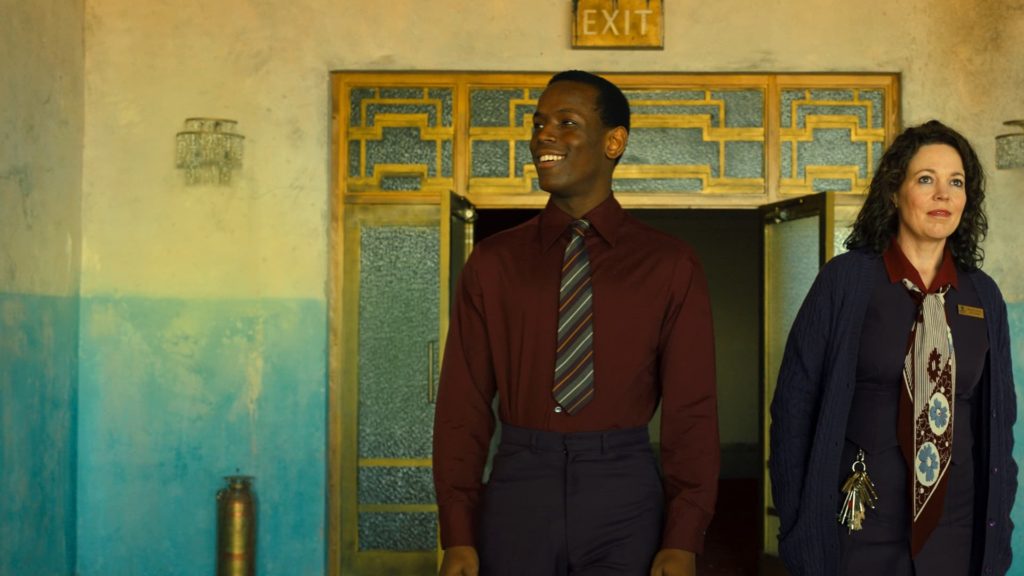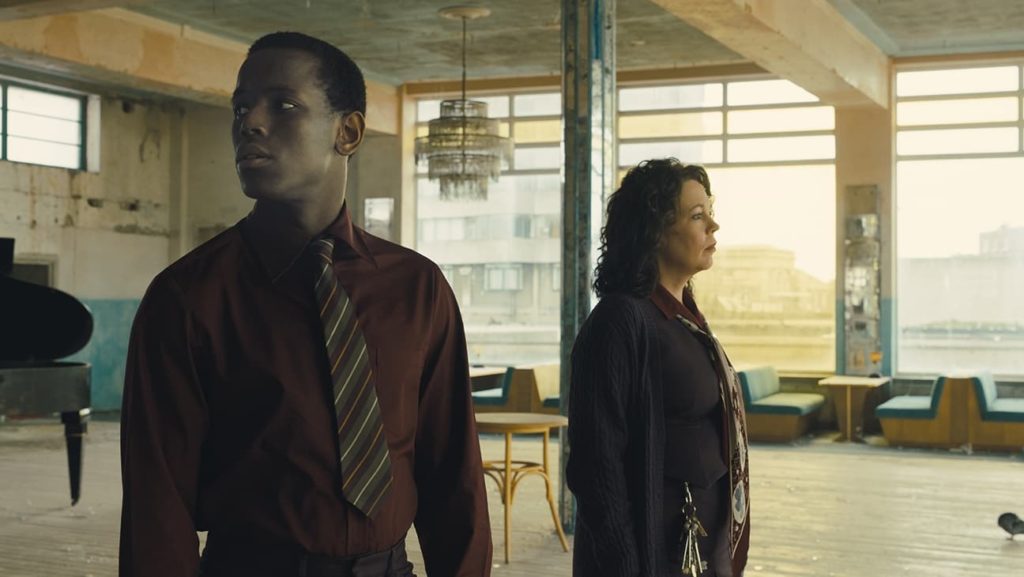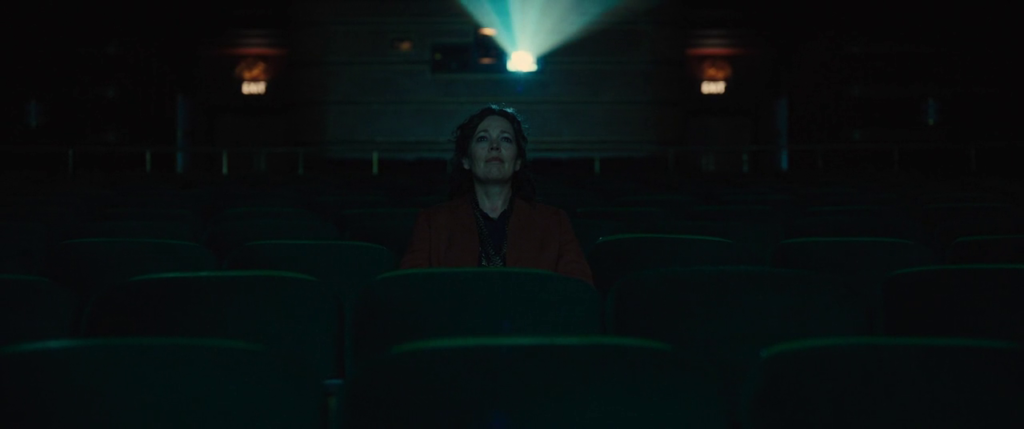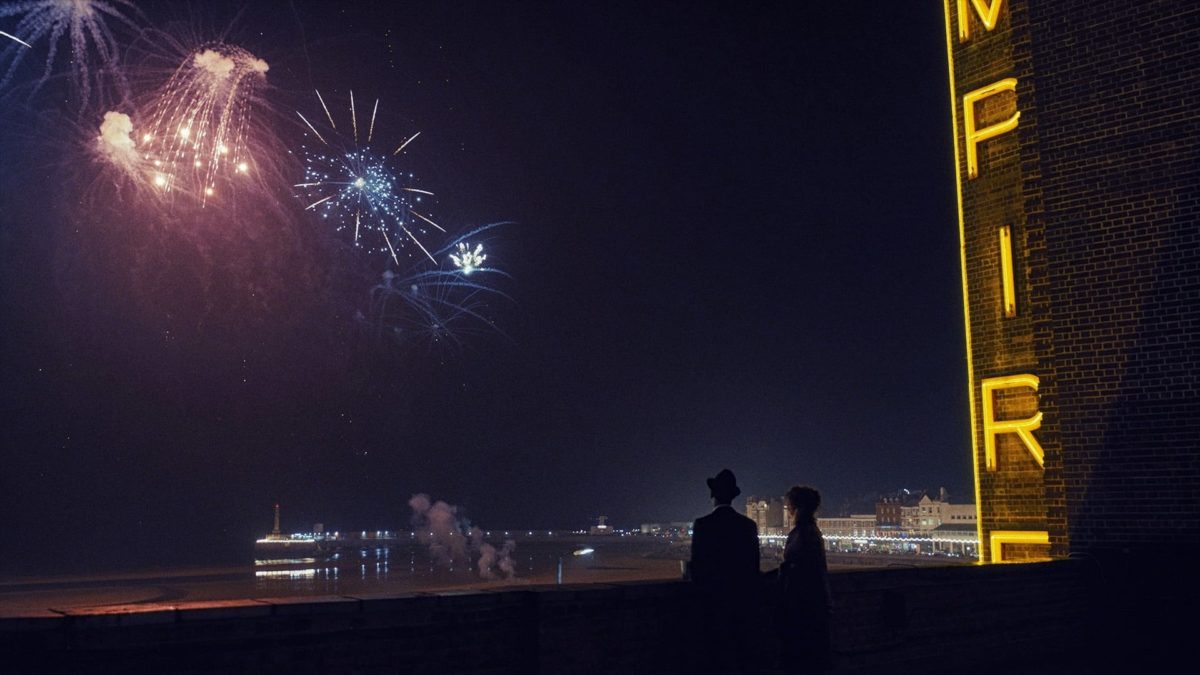Empire of snores
Empire of Light is not quite good, but it is a mostly harmless movie. It bugs me less than, say, Amsterdam or Don’t Worry Darling because the main flaw in its writing is not smarm or faux-cleverness, but naivete. It’s more in the boat of Armageddon Time: a handsome and engaging film weighed down with exhausting clichés about how racism is bad. Maybe I should just stop comparing it to other movies and discuss what the thing actually is, but I assure you it’s not all that interesting.
Written and directed by Sam Mendes, Empire of Light is a drama taking place in early 1980s England. It follows the workers at a movie theater called The Empire that we can say with confidence, despite it not being a textual subject of the film, will be out of business within ten years (possibly one year). Hilary (Olivia Colman) isn’t a manager but does a little bit of everything at the theater the way an assistant manager might. She is a lonely, single, middle-aged woman battling mental health issues but whom everyone seems to get along with and enjoy spending time with. She is in the midst of an affair with the theater’s manager Donald (Colin Firth). The cut that reveals this affair is the single funniest moment of the film — an abrupt depiction of an awkward hand job.

The Empire’s status quo is shaken up when Stephen (Michael Ward), a young black man, joins its staff. As Hilary trains him on his first shift, the two develop a bit of a connection. To Hilary, Stephen is a bolt of energy and idealism in her increasingly jaded and closed-off world. What Stephen finds appealing in Hilary, though, I could never figure out. Regardless, their scenes together are the loveliest in the film, especially those shot in a closed down wing of the theater, all dusty and amber-lit and full of metaphoric visual content in a way that Mendes desperately wishes the script could back up.
Where the movie stumbles is when it focuses not on its mood or its cast chemistry but its plot and the subsequent themes, which are all quite heavy-handed. The main one is that Stephen becomes the target of frequent racism and eventually racial violence. Certainly with the correct writer and approach, this could have dovetailed nicely with the atmosphere of decay depicted within the theater, but Mendes doesn’t come close to nailing that. Instead, this is a surface-level, run-of-the-mill, don’t-be-a-bigot story.
Meanwhile, Hilary undergoes a mental health breakdown, which is also a bit by-the-numbers in an exhausting sort of way. It all feels a bit awkwardly smushed together, as if Mendes thought that these ingredients and themes are what his story ought to have to be serious cinema: Depression, racism, a smidge of trauma, etc.

Without question, the most important strength of the film is the cinematography by Roger Deakins, and I really do think that it is some of the best of the year. Even more than Darius Khondji’s work in Armageddon Time, Deakins manages to capture all conceptual ideas with his visual timbre alone. My favorite touch is the lighting of the closed-off wing of The Empire (which it finally occurs to me is a very on-the-nose name for a British theater in decline): Light streams in through windows of various tints, blending in the dusty air like watercolors come to life. It gives the sensation of a mixed up world that isn’t functioning quite right, but is still on the verge of something beautiful. The last gasp of something wondrous.
I should also note that this movie is yet another 2022 “love letter to cinema” — as has become the term du jour for movies about movies. These types of movies always have one or more shot from a low angle of a character watching a screen, the pin pick of light coming from the projector forming a cone. It’s a total cliche, but, I admit, one I’m a sucker for. I know; I’m a movie lover and a sap, so an easy target for this kind of thing. Between this movie and Babylon and The Fabelmans and probably a few others I’m forgetting about, you could have a several-minute super-cut of just this kind of shot from films in 2022.

The acting is all-around strong, with Colman in particular a delight. She captures all of the different emotions and threads of the protagonist, making the story feel slightly more whole than it actually is. And near the end of the movie, when we see her eyes glowing and a warm smile on her face in one of the movie’s few perfect shots, it nearly brought tears to my eyes. She’s just that expressive and humane an actor.
The rest of the ensemble does good work, too. Ward is a new face to me, but he’s very inviting and charismatic and has terrific chemistry with Firth brings some dark comedy without sacrificing the dramatic texture of the film, and Toby Jones appears as a sage projectionist who gets a couple of nice monologues.
Miraculously, the film clocks in at under two hours, but I would’ve sworn otherwise just based on how long it feels. To put it bluntly, Empire of Light is often quite boring, though I wouldn’t call it aggressively bad in any sort of way. After all, its message boils down to: be kind, persevere, and watch movies. That sounds about right to me.
Is It Good?
Nearly Good (4/8)
Awards, Honors, & Rankings
- The B.A.D.S. (2022) - Best Cinematography (Nominee)
Dan is the founder and head critic of The Goods. Follow Dan on Letterboxd. Join the Discord for updates and discussion.


2 replies on “Empire of Light (2022)”
I mean, I’ll take a movie about movies over a YouTube video about YouTube videos, I guess, but even though I like Mendes a lot this could not be a lower priority.
My wife reads a lot, and I complain about how too many books are about people who love or write books. When we watched La La Land together, she complained about how too many movies are about people who love or make movies. 2022 has definitely borne that out.